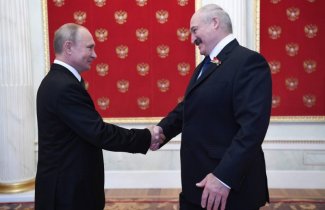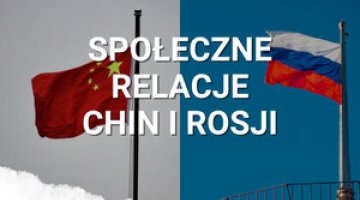A friend in need. Russia on the protests in Belarus

Due to the dynamic and surprising development of events in Belarus, Russia’s previous tactic –weakening Alyaksandr Lukashenka’s position in order to force further integration with Russia – has had to change. Moscow’s restrained public reaction to the result of the Belarusian elections and Lukashenka’s appeals for help may suggest that in the face of mass protests, the wave of strikes and the initial signs that the ruling elite in Belarus is starting to break up, the Kremlin is considering the various scenarios in the neighbouring republic, including Lukashenka’s possible resignation. Moscow’s support is of key importance for the Belarusian regime, but Russia’s readiness to grant that support to Lukashenka – a difficult partner who now faces the threat of losing power – although considerable, does not seem unconditional. The scope and form of any such support will be the subject of the Kremlin’s calculations; these will be based both on how events in Belarus develop further, and on assessing the potential gains and losses for Moscow in the context of its relations with Minsk, the internal situation in Russia itself, and the attitude of the West. In the short term, Moscow is likely to try, both overtly and covertly, to prevent the uncontrolled collapse of the Belarusian regime, while sounding out possible replacements for Lukashenka and the political consequences thereof. Russia’s priority remains obtaining guarantees that the integration of both countries will be further deepened and Russia’s long-term interests respected.
Russia on the protests in Belarus
The developments in Belarus have surprised observers, including in the Kremlin. Russia seems to have assumed an undisputed victory for Lukashenka and the rapid suppression of post-election protests and had been preparing to increase pressure on Minsk and force it to make further concessions. One sign of this was the laconic congratulatory cable sent by Vladimir Putin the day after the elections, which emphasised the need to further deepen the integration of both countries.
When the protests started, Moscow seemed to be counting on Lukashenka to suppress the then-limited protest actions, which would have triggered Western sanctions against Belarus and deepened its dependence on Russia. In view of the massive scale of the protests, the wave of strikes and Lukashenka’s increasingly tense appeals for support from Russia, the Kremlin has shown clear restraint. In a telephone conversation with Lukashenka on 16 August, Putin admitted that assistance from Russia could be provided to Belarus on the basis of the legislation of the Union State and the Collective Security Treaty Organisation (a two-sentence communiqué to that effect was published after the conversation). Nevertheless, his declarations were somewhat watered down by the reservations expressed by high representatives of the CSTO itself, as well as key Russian institutions (including the Federation Council) controlled by the Kremlin.
Neither has Lukashenka received any support from the propaganda machine in Russia. Russian state media reported cautiously on the results of the elections in Belarus, reporting that Lukashenka had been ‘declared the victor by the electoral committee’, rather than unambiguously proclaiming his victory. President Putin’s eloquent silence in the days following the elections came in stark contrast to the narrative in the Kremlin media and pro-government opinion-makers; they have openly been speaking about a probable or even inevitable defeat for Lukashenka (these include a statement by Aleksei Pushkov, a senator and ex-head of the State Duma Foreign Affairs Committee).
At the same time, the Kremlin has been making clear its categorical objection to any Western interference in Belarusian affairs. During telephone conversations with Chancellor Angela Merkel, President Emmanuel Macron and the President of the European Council, Charles Michel, Putin stressed that any external interference in Belarusian affairs or pressure on the republic’s authorities was unacceptable. The narrative from pro-Kremlin commentators and media has also been unequivocally anti-Western in tone. They depicted the developments in Belarus as a special operation of the West, and portrayed the protests as being led by provocateurs controlled from the West (including Poland), just as Belarusian state propaganda has been doing. However, the Russian media narrative clearly separated such ‘provocateurs’ from the pro-Russian majority of the protesters in Belarus.
Belarus’s importance for Russia
The Republic of Belarus is strategically important for Russia on many levels, primarily due to its geostrategic location (which Moscow exploits for military purposes), and its political and cultural significance in Russia’s projects to integrate the post-Soviet area. Belarus is the most westerly country bordering with Russia; it is a buffer between Russia and those countries of Central Europe that are members of Euro-Atlantic structures, which Moscow perceives as anti-Russian.
In political terms, Moscow considers the Republic of Belarus to be part of its natural sphere of influence, which consists of those former republics of the USSR which are politically and economically tied to Russia. The Kremlin sees Belarus as a key element of the so-called ‘Russian world’, a civilisational space centred around Moscow. Belarus is an important member of the integration structures which Russia has established in the post-Soviet area: the Union State of Russia and Belarus, the CSTO (a military-political alliance intended to counterbalance NATO), the Eurasian Union (modelled on the EU), and finally the Commonwealth of Independent States.
The degree to which Belarus is dependent on Russia is best illustrated by the military and economic dimensions of this cooperation. In the military sphere, Russia sees Belarus as a potential area to develop its own armed formations in the event of conflict with the West. The Belarusian army is closely integrated with the Russian army. Russia retains influence over the senior officer cadre of the Russian Armed Forces, and the formulas of cooperation developed over the years make it difficult for Minsk to use its own army in any independent way. The republic is fully dependent on military cooperation with and support from Russia: its own armed forces and arms industry cannot alone guarantee independence for Belarus.
In economic terms, Belarus has been subsidised by Russia for years through supplies of energy resources at preferential rates; these have met its internal needs, and after processing and exporting they have also become a source of foreign currency. Russia is also an important market for many Belarusian goods. Moscow has been exploiting Minsk’s economic dependence to push for the integration of both countries, including trying to persuade Lukashenka to sign 31 so-called ‘integration roadmaps’. In the coming years, in the option most desirable for Moscow, this could lead to a significant increase (including institutionally) in Belarus’s dependence on Russia, which would limit its sovereignty to a symbolic minimum.
Russia’s current plans for Belarus
In the face of the present destabilisation, Moscow’s immediate goals are to prevent the uncontrolled collapse of the Belarusian regime and obtain guarantees that Russian interests will be respected in the event that Lukashenka is removed. It can be presumed that Russia is currently making unofficial efforts to secure its interests These may include negotiations with Lukashenka, either about conditions for granting him support or for his resignation, and pushing the most favourable candidate for Moscow in any possible re-runs of the election.
However, the Russian tactic will be determined by Russia’s long-term interests towards Belarus, and these remain unchanged. The key goal is to keep Belarus within the Russian orbit of influence, since it is now – after Russian-Ukrainian conflict – the core of the so-called ‘Russian world’. Moscow wants Minsk as a partner which is not only loyal, but so dependent on Russia that any prospects for its geopolitical emancipation or closer relations with the West remain purely theoretical. To this end, it will push for deeper integration with Minsk on the economic, political and military levels.
It is of fundamental importance for Russia to maintain close military integration with Belarus, as well as to keep the present formula for cooperation with its armed forces. Its key interests include ensuring that the command of the Russian Western Military District retains its influence over the use of the Belarusian army; preserving Moscow’s influence over the senior officer cadre of the Belarusian Armed Forces; and maintaining the strategic military facilities on Belarusian territory (the anti-missile early-warning station in Hantsavichy and the Russian Marines’ submarine communication facility in Vileyka). Regarding the relations between the two states’ secret services, Russia’s primary aim is to maintain the coordination of their activities regarding the joint defence of Belarus’s border with EU countries; their intelligence cooperation against NATO; and the fight against organised crime and terrorism.
It is also important for Moscow to maintain its hegemony over Belarus in the context of counteracting the democratic transformation of regimes in the post-Soviet area. Russia, as an authoritarian country which has been ruled uninterruptedly for 20 years by the same leader, has an extremely negative attitude towards grassroots social revolts. Faced with a decline in his own popularity, Putin may fear that success for the street revolution in Belarus – which has much in common culturally with Russian – could encourage his own people to undertake anti-government activity as well.
Intervention or hybrid diplomacy?
Even though the mood of the Belarusians protesting against Lukashenka is not anti-Russian, which invalidates any comparisons with the ‘revolution of dignity’ in Ukraine, Russia would prefer the status quo to a victory for the revolution. This is due not only to the internal calculations indicated above (Putin’s fear that it will set a bad example for the Russian people), but also to the belief that the empowerment of Belarusian society and the democratisation of Belarus would automatically be a pro-Western phenomenon. Russia would regard this process adverse, even if it does become the main player after the possible fall of Lukashenka.
For this reason, it cannot be ruled out that – if the regime in Belarus collapses, but a clear alternative candidate acceptable to Russia fails to emerge – Moscow may decide to support Lukashenka by means of force. However, the question about the scale and degree to which Russia will get involved remains open. It is very likely that Lukashenka will receive some kind of ‘hybrid’ support – especially if he retains control over the power structures and nomenclature. Should the Belarusian authorities resume the brutal suppression of the social protests, Russia could provide its law enforcement bodies with material aid, or informally dispatch units of the Russian National Guard onto Belarusian territory. Support may also come from the secret services: some reports indicate that consultations have been taking place at this level, including a visit by a delegation of Russian special services to Belarus.
The most radical variant – open military intervention – cannot be entirely ruled out, although it would raise many doubts, and Moscow would prefer to avoid such a move. It is not clear under what banner such an operation could take place; one of the reasons that would make the use of the CSTO for this purpose hard is a possible objection from Kazakhstan, which had been seriously concerned with the previous Russian interventions in Crimea and the Donbas. Moscow could even hypothetically decide to use force in Belarus on its own, entrusting such an operation to the command of the Regional Army Group of the Union State that it fully controls. However, such an intervention would very likely provoke an escalation of the West’s sanctions towards Russia. On the other hand, Russia’s ‘constructive’ stance on Belarus could be rewarded with an easing of sanctions, something Moscow has been seeking for some time. Another reason for Russia to opt for the diplomatic path could be its awareness that the West (whose key leaders have been reaching to Putin) considers Moscow the main player in Belarus, and will continue to respect its position.
Finally, military intervention would risk reawakening anti-Russian sentiments in Belarusian society (which currently holds a positive attitude towards Russia), as was the case in Ukraine after 2014. It is also highly doubtful whether such a move would be received positively by the Russian people themselves, who in recent years have expected their leadership to solve the country’s internal social and economic problems rather than get involved in costly military operations abroad, and who have to this end been manifesting visible (albeit local) protest activity. It seems that in today’s Russia, a military intervention under the slogans of ‘providing brotherly assistance to Belarus’ within the ‘Russian world’ would have no chance of achieving the same propaganda success and boosting the government’s ratings as Crimea did. The protest in Belarus seems to be very popular in Russia; widespread access to Internet gives Russians access to many independent reports from Belarus. Admiration for and solidarity with the peacefully protesting Belarusians have been expressed by many ordinary Russians, even those who stress that they have hitherto avoided politics.




